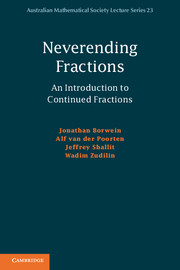Book contents
- Frontmatter
- Contents
- Preface
- 1 Some preliminaries from number theory
- 2 Continued fractions
- 3 Metric theory of continued fractions
- 4 Quadratic irrationals through a magnifier
- 5 Hyperelliptic curves and Somos sequences
- 6 From folding to Fibonacci
- 7 The integer part of qα + β
- 8 The Erdős–Moser equation
- 9 Irregular continued fractions
- Appendix A Selected continued fractions
- References
- Index
7 - The integer part of qα + β
Published online by Cambridge University Press: 05 July 2014
- Frontmatter
- Contents
- Preface
- 1 Some preliminaries from number theory
- 2 Continued fractions
- 3 Metric theory of continued fractions
- 4 Quadratic irrationals through a magnifier
- 5 Hyperelliptic curves and Somos sequences
- 6 From folding to Fibonacci
- 7 The integer part of qα + β
- 8 The Erdős–Moser equation
- 9 Irregular continued fractions
- Appendix A Selected continued fractions
- References
- Index
Summary
We turn to the study of a class of generating functions that, somewhat like the folds and ripples of the previous chapter, lead to remarkable continued fractions and rational approximations. They rely on an inhomogeneous continuous function algorithm discussed below.
Inhomogeneous Diophantine approximation
As we have already learnt, the convergents pn/qn of a continued fraction [a0; a1, a2, …] representing the real irrational number α minimise the quantity |qα−p|. The related homogeneous Diophantine problem initiated by Dirichlet's theorem (Theorem 1.36) and discussed in Sections 1.4 and 1.5 was in fact our motivation to develop the theory of continued fractions.
It is not therefore completely unreasonable to believe that a slightly more general minimisation problem for the quantity |qα + β − p|, where β is another (not necessarily irrational) real number already considered in Chebyshev's theorem (Exercise 1.39), gives rise to a natural extension of continued fractions. More important is not so much the algorithmic solution of this inhomogeneous Diophantine approximation problem but its many consequences.
Because the replacement of α and β by their fractional parts does not affect the Diophantine problem, we will assume that they lie between 0 and 1.
- Type
- Chapter
- Information
- Neverending FractionsAn Introduction to Continued Fractions, pp. 127 - 146Publisher: Cambridge University PressPrint publication year: 2014



